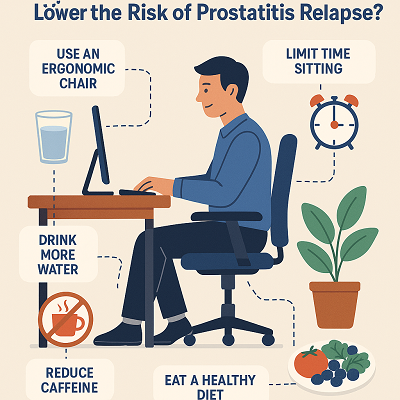How Can IT Professionals Adjust Their Work Environment to Lower the Risk of Prostatitis Relapse?
If you're working in IT, chances are you spend most of your day sitting in front of a computer. Coding, debugging, endless meetings—it all adds up. But what you might not realize is that long hours of sitting, constant mental stress, and irregular habits could be making you more vulnerable to prostatitis, especially if you've had it before.
The good news? A few simple changes in your daily routine and workspace can help reduce the risk of symptoms flaring up again. Here's what really makes a difference.

1. Sitting Smarter: Your Chair Matters More Than You Think
Let's face it—most of us don't think much about our chairs. But sitting for hours in the wrong position can put pressure on the prostate and slow down blood flow, which doesn't help if you're already dealing with inflammation.
What to try:
- Use an ergonomic chair that supports your lower back and pelvis.
- A cushion with a gap in the middle can help relieve pressure in the right spots.
- Sit upright, feet flat on the floor. Try not to cross your legs for long periods.
2. Don't Stay Glued to the Chair
When you're deep into a project, it's easy to lose track of time. But sitting too long is one of the worst things you can do if you're prone to prostatitis.
Instead:
- Stand up and stretch every 45–60 minutes.
- Use a sit-stand desk if you have access to one.
- Even short walks around the office or during a phone call can help keep your circulation going.
3. Drink More Water (and Less Caffeine)
Many developers and engineers run on coffee or energy drinks, but too much caffeine can irritate the bladder and worsen urinary symptoms.
Try this:
- Sip water throughout the day—about 1.5 to 2 liters is a good goal.
- Cut back on strong coffee, soda, and energy drinks.
- Avoid drinking too much liquid close to bedtime to reduce nighttime trips to the bathroom.
4. Keep Your Lower Body Warm
Sitting in a cold office or right under the AC for hours might seem harmless, but it can tighten blood vessels and worsen pelvic discomfort.
Tips:
- Don't sit directly under air vents.
- Keep your lower back and pelvis warm—layer up if needed.
- In winter, a seat warmer or small cushion can make a big difference.
5. Don't Let Stress Build Up
Tight deadlines, bugs that won't go away, endless Slack messages—it all adds up. Chronic stress doesn't just affect your mood; it can also mess with your immune system and aggravate inflammation.
Some quick ways to reset:
- Take a few deep breaths during breaks.
- Step outside for 5–10 minutes of sunlight.
- Try short breathing or meditation exercises. Even a few minutes can help.
6. Eat Better, Even at the Desk
IT professionals are notorious for skipping meals or grabbing fast food. But what you eat can either help your body recover—or slow it down.
Go for:
- Anti-inflammatory foods like tomatoes, spinach, blueberries, and pumpkin seeds.
- Healthy snacks like almonds, apples, or a boiled egg.
- Less greasy takeout, spicy food, or alcohol—these can all irritate the prostate.
7. Consider Herbal Support If You're Prone to Flare-Ups
If your prostatitis keeps coming back, you may need more than just lifestyle changes. Some herbal formulas used in Traditional Chinese Medicine can offer long-term support.
One option is the Diuretic and Anti-inflammatory Pill, which is known for:
- Clearing heat and dampness
- Easing urinary discomfort
- Supporting prostate health over time
It's especially helpful for men who've tried antibiotics or other treatments without much improvement.
Final Thoughts
Working in IT doesn't mean you're doomed to deal with prostatitis forever. By paying a little more attention to how you sit, move, eat, and manage stress, you can take real steps to protect your health—without quitting your job or changing your career.
Small changes can make a big difference. Your prostate will thank you.



